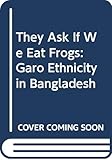They Ask if We Eat Frogs : Garo Ethnicity in Bangladesh / Ellen Bal.
Material type: TextPublisher: Singapore : ISEAS Publishing, [2007]Copyright date: ©2007Description: 1 online resource (258 p.)Content type:
TextPublisher: Singapore : ISEAS Publishing, [2007]Copyright date: ©2007Description: 1 online resource (258 p.)Content type: - 9789812304469
- 9789812305916
- 954.92004954 23
- DS393.83.G37 B35 2007
- DS393.83.G37 B35 2015
- online - DeGruyter
| Item type | Current library | Call number | URL | Status | Notes | Barcode | |
|---|---|---|---|---|---|---|---|
 eBook
eBook
|
Biblioteca "Angelicum" Pont. Univ. S.Tommaso d'Aquino Nuvola online | online - DeGruyter (Browse shelf(Opens below)) | Online access | Not for loan (Accesso limitato) | Accesso per gli utenti autorizzati / Access for authorized users | (dgr)9789812305916 |
Frontmatter -- CONTENTS -- ACKNOWLEDGEMENTS -- GLOSSARY -- 1. Introduction -- 2. The History of a Persistent Image -- 3. ‘The Importance of Being Garo’: Garo Narratives of Self -- 4. Peoples without History? -- 5. ‘Dual were Dual, Kochu were Kochu’: Garos Divided -- 6. Negotiable Boundaries, Negotiable Identities -- 7. Garos and Christianity -- 8. Garos and the State -- 9. Summary and Conclusion: From Tribes to Ethnic Minorities -- REFERENCES -- INDEX -- ABOUT THE AUTHOR
restricted access online access with authorization star
http://purl.org/coar/access_right/c_16ec
This study is a critical investigation into the category of tribes in South Asia. It breaks away from previous studies of tribes in the region. While it focuses on one so-called tribal community, the Garos of Bangladesh, it neither studies Garo culture as such, nor their social organization. Instead it deals with the evolution of Garo identity/ethnicity and with the progressive making of cultural characteristics that support a sense of "Garo-ness", in the context of the complex historical developments in this part of South Asia and the world. The importance of this work is not confined to a better understanding of how smaller ethnic groups form, survive or disappear in modern society. It also leads to a more comprehensive insight into how social life in the border region of South and Southeast Asia is organized and how it has transformed over time. This book will be of interest to historians, anthropologists, sociologists, political scientists, students, scholars of South and Southeast Asia and policy-makers.
Mode of access: Internet via World Wide Web.
In English.
Description based on online resource; title from PDF title page (publisher's Web site, viewed 01. Dez 2022)


